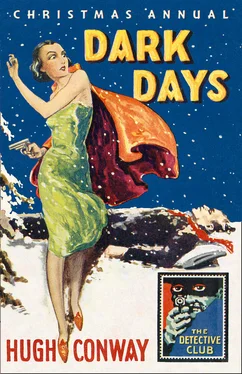I threw out my arms. My heart was full of rage and bitterness. ‘And you became this man’s mistress rather than my wife!’ I gasped. Neither my love nor her sorrow could stop this one reproach from passing my lips.
She sprang to her feet. ‘You!’ she cried. ‘Do you—think—do you imagine—? Read! Only this morning I learnt it.’
She threw a letter towards me—threw it with a gesture of loathing, as one throws a nauseous reptile from one’s hand. I opened it mechanically.
‘Yes,’ she said, ‘you were right in thinking I had fallen low. So low that I went where he chose to send me. So low that I would have forgiven the ill treatment of months—the blow, even. Why? Because until this morning he was my husband. Read the letter. Basil, did you ever hate a man?’
Before I read I glanced at her in alarm. She spoke with almost feverish excitement. Her words followed one another with headlong rapidity. But who could wonder at this mood with a woman who had such a wrong to declare? She grew calm beneath my glance.
‘Read,’ she said, beseechingly. ‘Ah, God! I have fallen low; but not so low as you thought.’
She buried her face in her hands whilst I opened and read the letter. It was dated from Paris, and ran so:
‘As it seems to me that we can’t exactly hit it off together, I think the farce had better end. The simplest way to make my meaning clear is to tell you that when I married you I had a wife alive. She has died since then; and I dare say, had we managed to get on better together, I should have asked you to go through the marriage ceremony once more. However, as things are now, so they had better stop. You have the satisfaction of knowing that morally you are blameless.
‘If, like a sensible girl, you are ready to accept the situation, I am prepared to act generously, and do the right thing in money matters. As I hate to have anything hanging over me unsettled, and do not care to trust delicate negotiations to a third party, I shall run across to England and see you. I shall reach Roding on Wednesday evening. Do not send to the station to meet me; I would rather walk.’
The letter was unsigned. My blood boiled as I read it; yet, in spite of my rage, I felt a grim humour as I realised the exquisite cynicism possessed by the writer. Here was a man striking a foul and recreant blow at a woman whom he once loved—a blow that must crush her to the earth. His own words confess him a rogue, a bigamist; and yet he can speak coolly about money arrangements; can even enter into petty details concerning his approaching visit! He must be without shame, without remorse; a villain, absolutely heartless!
I folded the letter and placed it in my breast. I wished to keep it, that I might read it again and again during the next twenty-four hours. Long hours they would be. This letter would aid me to make them pass. Philippa made no objection to my keeping it. She sat motionless, gazing gloomily into the fire.
‘You knew the man’s right name and title?’ I asked.
‘Yes, from the first. Ah! There I wronged myself, Basil! The rank, the riches perhaps, tempted me; and—Basil, I loved him then.’
Oh, the piteous regret breathed in that last sentence! I ground my teeth, and felt that there was a stronger passion than even love. ‘That man and I meet tomorrow,’ I told myself softly.
‘But you spoke of a child?’ I said, turning to Philippa.
‘It is dead—dead—dead!’ she cried, with a wild laugh. ‘A fortnight ago it died. Dead! My grief then; my joy today! See! I am in mourning; tomorrow I shall put that mourning off. Why mourn for what is a happy event? No black after tomorrow.’
Her mood had once more become excited. As before, her words came with feverish rapidity. I took her hands in mine; they were now burning.
‘Philippa, dearest, be calm. You will see that man no more?’
‘I will see him no more. It is to save myself from seeing him that I come to you. Little right have I to ask aid from you; but your words came back to me in my need. There was one friend to turn to. Help me, Basil! I come to you as a sister may come to a brother.’
‘As a sister to a brother,’ I echoed. ‘I accept the trust,’ I added, laying my lips reverentially on her white forehead, and vowing mentally to devote my life to her.
‘You will stay here now?’ I asked.
‘No, I must go back. Tomorrow I will come—tomorrow. Basil, my brother, you will take me far away—far away?’
‘Where you wish. Every land is as one to me now.’
She had given me the right, a brother’s right, to stand between her and the villain who had wronged her. Tomorrow that man would be here! How I longed for the moment which would bring us face to face!
Philippa rose. ‘I must go,’ she said.
I pressed food and wine upon her: she would take nothing. She made, however, no objection to my accompanying her to her home. We left the house by the casement by which she entered. Together we stepped out on the snow-whitened road. She took my arm, and we walked towards her home.
I asked her with whom she was staying. She told me with a widow-lady and two children, named Wilson. She went to them at Sir Mervyn Ferrand’s command. Mrs Wilson, he told her, was a distant connection of his own, and he had made arrangements for her to look after Philippa during her illness.
It was but another proof of the man’s revolting cynicism. To send the woman who falsely believed herself to be his wife to one of his own relations! Oh, I would have a full reckoning with him!
‘What name do they know you by?’ I asked.
‘He said I was to call myself by the false name, which, for purposes of his own, he chose to pass under. But I felt myself absolved from my promise of secrecy. Why should I stay in a strange house with strange people by Sir Mervyn Ferrand’s request, unless I could show good cause for doing so? So I told Mrs Wilson everything.’
‘She believed you?’
‘She was bound to believe me. I would have no doubt cast upon my word. I showed her the certificate of my marriage. Whatever she may have thought at first, she saw then that I was his wife. No one else knows it except her. To her I am Lady Ferrand. Like me, she never dreamed to what man’s villainy can reach. Oh, Basil, Basil! Why are such men allowed to live?’
For the first time Philippa seemed to break down. Till now the chief characteristics of her mood had been scorn and anger. Now, sheer grief for the time appeared to sweep away every other emotion. Sob after sob broke from her. I endeavoured to calm her—to comfort her. Alas! How little I could say or do to these ends! She leaned heavily and despondingly on my arm, and for a long while we walked in silence. At last she told me her home was close at hand.
‘Listen, Philippa,’ I said; ‘I shall come in with you and see this lady with whom you are staying. I shall tell her I am your brother; that for some time I have known how shamefully your husband has neglected you; and that now, with your full consent, I mean to take you away. Whether this woman believes in our relationship or not, matters nothing. I suppose she knows that man is coming tomorrow. After his heartless desertion, she cannot be surprised at your wish to avoid meeting him.’
I paused. Philippa bent her head as if assenting to my plan.
‘Tomorrow,’ I continued, ‘long before that wretch comes here to poison the very air we breathe, I shall come and fetch you. Early in the morning I will send my servant for your luggage. Mrs Wilson may know me and my man by sight. That makes no difference. There need be no concealment. You are free to come and go. You have no one to fear. On Thursday morning we will leave this place.’
‘Yes,’ said Philippa, dreamily, ‘tomorrow I will leave—I will come to you. But I will come alone. In the evening most likely, when no one will know where I have gone.’
Читать дальше












